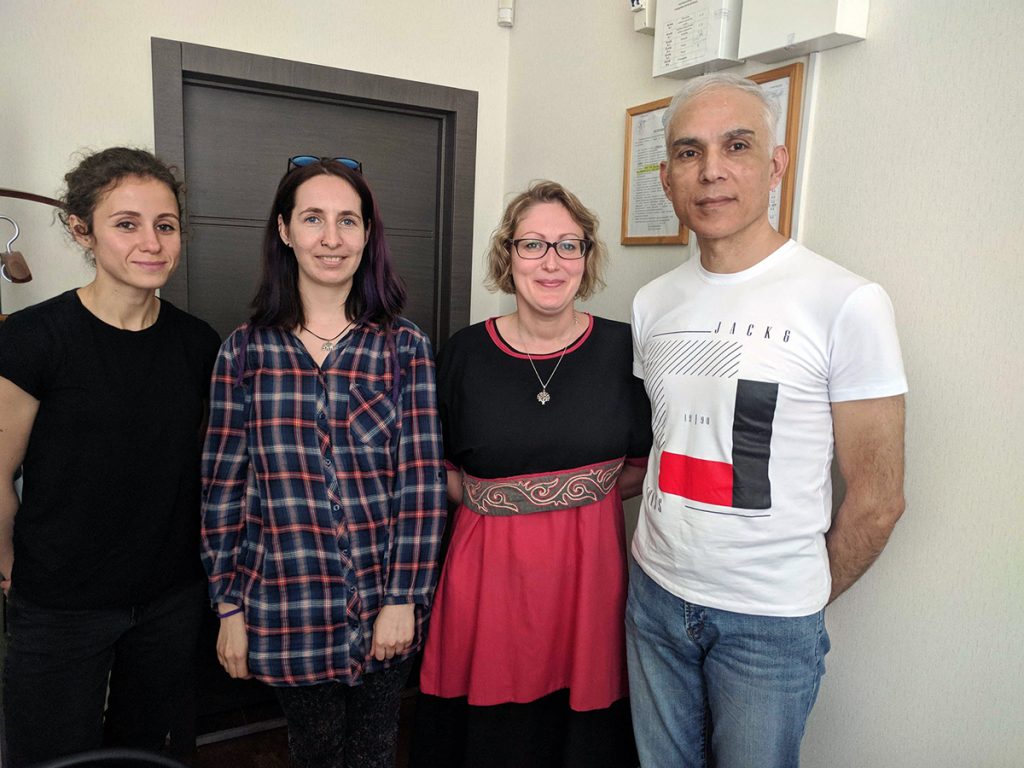On June 17, 2019, citizen of the Islamic Republic of Iran Mehrdad Jamshidian was notified that he could stay in the Republic of Belarus due to impossibility to deport him to other states. It is noted in the official statement of the Citizenship and Migration Department that the decision was made “for humanitarian reasons”. Mehrdad says it was a collective victory and thanks all those who supported him within all this time. This is what he sent us after this news:
Thank you Lord and everyone I know who have worked hard and supported me and my family for many years, thank you very much and the Lord bless you.

Human Constanta has been engaged in the case of Mehrdad Jamshidian since 2014. During this time, the authorities held him in a temporary detention facility several times and ruled to expel or deport him.
The fact that today he can stay with his family is the result of joint professional work and solidarity of many people in the country and abroad. We have collected more than 2,000 signatures exclusively against the decision to deport him in the spring of 2019. Amnesty International has also announced an international action to support Mehrdad. During the seven years of Mehrdad’s misadventures, hundreds of people became involved in his history, helped him and his family, supported them or simply worried, prayed and were concerned. Now all these people can say “We’ve done it”.
We appreciate the humane decision of the state bodies and are happy for Mehrdad and thankful to everyone who has supported him. His history clearly shows the problems that foreigners at risk of expulsion and deportation in our country face. But this case also shows what can and should be done to defend human rights even in these conditions.
We would like to draw attention to several important human rights circumstances in the case of Mehrdad Jamshidian:
Содержание
Threat of the death penalty and torture in the absence of minimum fair trial standards. Refugee status applications and freedom of conscience
On August 25, 2012, Mehrdad returned to Minsk from Tehran, where he had visited his relatives.
On December 28, 2012, he was detained in Minsk at Iran’s request for criminal prosecution: M. M. Jamshidian is accused of having committed a crime in September 2012. He was accused of killing his mother and brother — an activist of the
On May 03, 2013, the Prosecutor General’s Office of the Republic of Belarus decided not to extradite Jamshidian due to Iran’s non-compliance with the general and special conditions of extradition. Jamshidian was released from detention.
His relatives in Iran provided witness statement concerning Mehrdad’s innocence and insisted on case dismissal. Nevertheless, since 2013 the Citizenship and Migration Department of the Republic of Belarus maintains the extradition procedure accompanied with arrests and continued detention. He applied for refugee status and was denied it for the first time in 2013. During the proceedings, it became publicly disclosed that in 2002 Mehrdad converted to Christianity, which is prosecuted in Iran. So, in 2015 he applied for the refugee status in Belarus again (and was denied), as well as for international protection to the Human Rights Committee — the body that monitors implementation of the International Covenant on Civil and Political Rights.
In its View No. 2471/2014 of November 8, 2017, the Human Rights Committee stated that in case of extradition Mehrdad may face a real risk of tortures and death penalty as a result of a trial that doesn’t meet minimum standards of a fair trial. The Committee encouraged the Republic of Belarus not to expel Mehrdad Jamshidian to Iran. Otherwise, the Committee noted, Belarus would violate its obligations under Articles 6 (the right to life) and 7 (the right to freedom from torture) of the Covenant. For Belarus this is the first unique View which regards expulsion.
On July 5, 2018, the Commission for the Control of Interpol’s Files, with due regard for the decision of the Human Rights Committee, excluded Mehrdad’s data from the international wanted list.
Now it can be stated that in this case the Republic of Belarus heeded the Committee’s conclusions and complied with its decisions through non-expulsion of Mehrdad. That’s the first time in our practice. Formerly Belarus disregarded Committee’s views and treated them as recommendations.
Right to family
Mehrdad lives in Belarus since 1993. His wife and 3 children are Belarusian citizens. His son and wife have severe oncological diseases. This was not taken into account when the decisions concerning expulsion were made in 2013 and 2019. In accordance with the official stance of internal affairs bodies, it was taken into account only now.
Continuous detention
In 2013 and in 2014 Mehrdad was twice detained for the future expulsion for 37 days (from May 03, 2013 to June 10, 2013) and for 3 consecutive months (from June 10,
We draw attention to the fact that legislation does not limit the detention period for foreigners arrested for identification, expulsion and deportation. Detention is not subject to regular review and judicial control, which often leads to the long-term incarceration of people, who are not even accused of anything. Moreover, temporary detention facilities are not designed for long-term custody. There is no possibility of communication with relatives and living conditions are unhealthy.
During the last detention, Mehrdad suffered a heart attack, but he spent only 3 days at the
Moreover, after the release, Mehrdad received a bill for more than 1,542.5 Belarusian rubles for staying in the detention facility. Though it is obvious that he can not fulfill this obligation.
Taking the Deportation Decision
On March 7, 2019, having received the identity documents from the Iranian Embassy, the Citizenship and Migration Department of Moscovskiy District decided to deport Mehrdad to Iran. On May 4, 2019, the Moscovskiy District Court considered the lawyer’s complaint against the deportation decision, cancelled the deportation and remitted the case for reconsideration due to violation of the judgement procedure. On May 14, 2019, Mehrdad was released from the temporary detention facility and judged to be deported, now on a voluntary basis. On June 12, 2019, the Citizenship and Migration Department of Moscovskiy District revoked deportation due to the threat of criminal prosecution in Iran without a guarantee of a fair trial, as well as the threat of torture.
Thus, it took almost 4 months to judge that Mehrdad could not be deported to Iran, which the lawyer stated from the very beginning. At the same time, Jamshidian remained in detention.
What’s Next?
On June 19, 2019, the authorities informed Mehrdad about the cancellation of deportation and accepted documents for a 1-year temporary residence.
Belarus allows temporary residents to be employed. But since Mehrdad is a foreign national, his employer will have to obtain a special permit for employment of foreigners. Sometimes this is a serious obstacle to finding a job. The situation is complicated by the fact that his identity document is still an ID certificate, which makes obtaining the work permit virtually impossible. Mehrdad’s passport expired when his second application for refugee status was being considered. Applying to the Embassy for a new passport carries the threat of arrest.
Mehrdad will be able to receive medical care in Belarusian institutions, but he will have to pay for it at the rate established for foreigners.
Mehrdad Jamshidian’s story has not ended yet. In order to rebuild his life, he will have to experience a lot of struggles. We hope that the decision will remain in force and he will have the opportunity of long-term legalization in Belarus.
Based on our experience with protection of rights of foreign nationals and stateless persons, we call on the Citizenship and Migration Department to use expulsion and deportation as a last resort for foreign nationals and stateless persons, to comply with legal procedures in full and to consider personal, family and economic ties of foreigners with our country.





